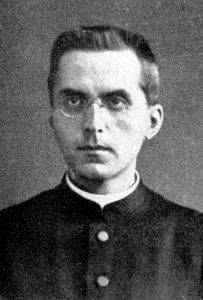Keith Johnson continues to develop both Karl Barth’s and Erich Przywara’s theories of knowledge of God, respectively. Currently, he is treating Przywara’s existentialist side towards a knowledge of God, as that is juxtaposed with what he identifies as the essence side (which we will not get into at this juncture). The essence side has to do with the immanent, or  the horizontal frame of reference in regard to knowledge vis à vis God; whereas the existentialist side has to do with the order of how vertical knowledge of God obtains vis à vis a God-human relation. Is this order from below to above or above to below? According to Johnson, Przywara maintains that an imbalance to either movement, relative to “above” and “below” knowledges of God, has led to what he calls ‘theopanism.’ Theopanism, for Przywara, is really just code for a complex of an active or passive relation to God, in regard to the direction that knowledge of God ingresses; whether that knowledge starts from above and is active on God’s side and passive on the human’s side, or whether it starts from below and is active on the human’s side and passive on God’s side. Either way this is panned, for Przwyara, it reduces to the problematic of what he, again, identifies as theopanism.
the horizontal frame of reference in regard to knowledge vis à vis God; whereas the existentialist side has to do with the order of how vertical knowledge of God obtains vis à vis a God-human relation. Is this order from below to above or above to below? According to Johnson, Przywara maintains that an imbalance to either movement, relative to “above” and “below” knowledges of God, has led to what he calls ‘theopanism.’ Theopanism, for Przywara, is really just code for a complex of an active or passive relation to God, in regard to the direction that knowledge of God ingresses; whether that knowledge starts from above and is active on God’s side and passive on the human’s side, or whether it starts from below and is active on the human’s side and passive on God’s side. Either way this is panned, for Przwyara, it reduces to the problematic of what he, again, identifies as theopanism.
The problem of existence raises a different question: ‘Does religion, as relation between God and humanity, come into being from above downwards, as ultimately an “act of God,” or is it formed from below upwards, from man, and therefore ultimately as an “act of man?” This question has been problematic, Przywara explains, because the tendency has been to choose one answer to the exclusion of the other. Here Przywara follows arguments he had developed in earlier essays and lectures. On the one hand, those who emphasize that the relationship is the result of an ‘act of God’ rob the world of its own reality by making the human relationship with God—and thus human existence itself—an extension of divine action. The result is that creation becomes nothing more an [sic] extension of God’s own life. This is the error of ‘theopanism’, and Przywara associates it with Luther and his modern heirs, including Barth. On the other hand, those who argue that this relationship is the product of an ‘act of man’ commit a form of pantheism because God merely becomes the ‘ultimate basis for all rationality’ and the ‘ideal meaning of humanity’. In the end, Przywara insists, the two errors merge into one as theopanism ‘appears at bottom to be only camouflaged’ pantheism. While pantheism is built on the rationalism of the active human being, theopanism is the rationalism of the passive human being; underneath these surface differences, however, they are nothing more than ‘two forms of one and the self-same rationalism’. God becomes simply ‘the cloak of an inward dialectic’, meaning that once again, any notion of true communion with God has proven impossible.1
Przywara’s critique, as presented by Johnson, is interesting in light of the fact that, with reference to Barth, he sees Barth, not to mention Luther et al., as endemic to the theopanist specter. The issue becomes, for me, not whether or not Barth et al. fall prey to Przywara’s critique, but whether or not Przywara’s premises are sound to begin with.
On face, I would claim that Przywara identifies a potential binary, that is between the divine and human, but this binary seems unremarkable in the sense that it is simply the classical identification of the Creator/creature distinction. To suggest that one side of that equation can be played off against the other, in the way Przywara seems to suggest, seems to presuppose an implicit and inherent dualism that God’s Self-revelation itself vitiates into the dither of no-thingness. That is to say: even with a classical Creator/creature distinction in play, that distinction, by revelational definition (V philosophical) is always already asymmetrical at greatest. God is God, as such, knowledge of Godself will always already, and necessarily be anterior to human knowledge of God; whether or not the latter knowledge be construed in active or passive categories. Thus, from the get-go, Przywara’s premise, in regard to his theopanism, begins to fail precisely at the point that he misrelates a God / human relation in a knowledge of God combine.
Johnson is just about to get into treating Przywara’s solution to this above-below / below-above dilemma vis à vis knowledge of God, as Przywara has presented the supposed problem. But, from the get-go, I have already spied a methodological and definitional problem in the way he has framed this dilemma. God is God is the all-important frame, particularly as that relates to the way humans know God. Jesus is the answer; what’s the question?
1 Keith L. Johnson, Karl Barth and the Analgia Entis (New York: T&T Clark, 2010), 69-70.
